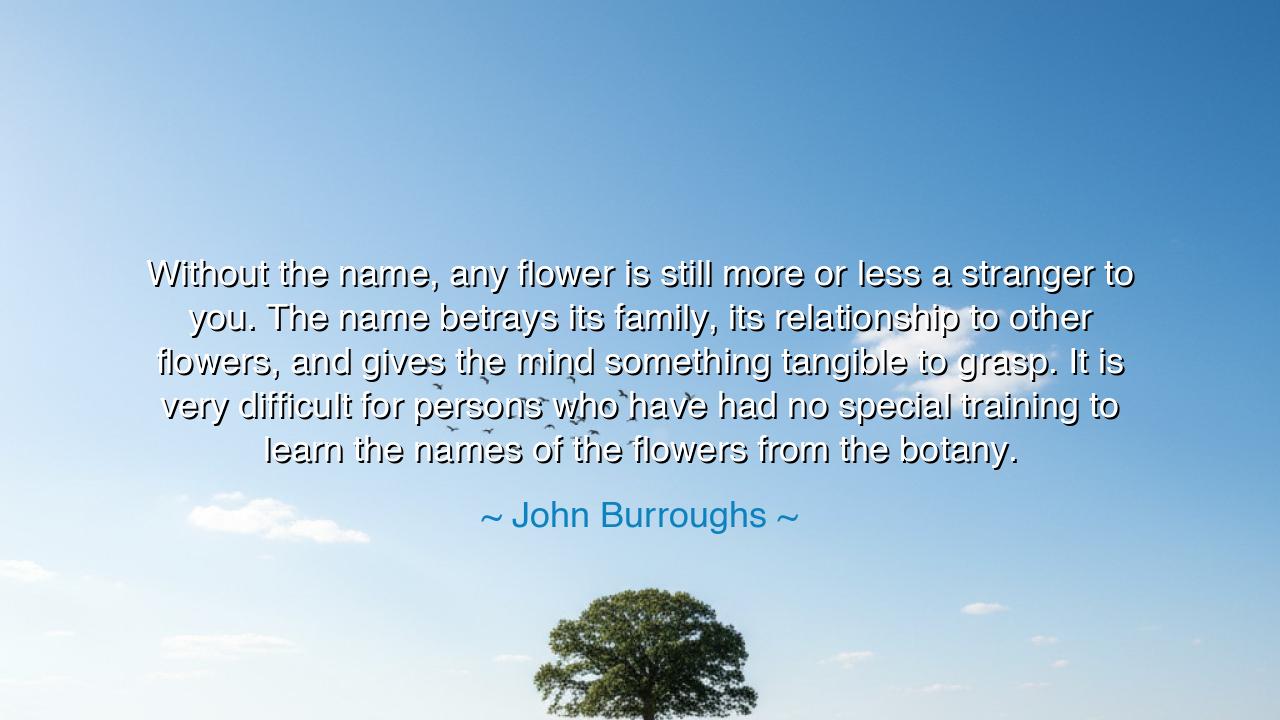
Without the name, any flower is still more or less a stranger to
Without the name, any flower is still more or less a stranger to you. The name betrays its family, its relationship to other flowers, and gives the mind something tangible to grasp. It is very difficult for persons who have had no special training to learn the names of the flowers from the botany.






The sage John Burroughs spoke with the voice of nature’s own wisdom when he declared: “Without the name, any flower is still more or less a stranger to you.” For though the blossom may dazzle the eye with color and fragrance, until it is called by its name, it drifts before us like a wanderer unknown, a fleeting beauty untethered to memory or meaning. To name is to anchor the ephemeral; it is to weave the fragile petal into the tapestry of knowledge, and thus, into the heart.
The name does more than label—it unveils the hidden kinship of all living things. As Burroughs taught, the name betrays its family, its lineage among the fields and forests, binding one flower to another in unseen fellowship. Just as a man is not truly known without his ancestry, so too is a flower but a solitary vision until its relationship to the greater order is revealed. Through names, the mind perceives unity where the eye sees only separation.
Yet the path to this wisdom is not without hardship. To the untrained soul, the world of botany is a labyrinth where each blossom conceals its truth beneath strange syllables and ancient tongues. Without guidance, the novice falters, overwhelmed by the multitude of forms and the subtlety of their distinctions. Burroughs, with the tenderness of a teacher, acknowledged that it is difficult for the uninitiated to master these mysteries without study, for nature demands patience and reverence from her seekers.
But consider, O listener, how the simple act of learning a name transforms the common meadow into a sacred scroll. No longer do we pass among strangers, but among companions whose stories we know and whose roots we honor. The eye delights in beauty, but the spirit rejoices in recognition. To name is not merely to know—it is to enter into friendship with the earth, and to walk no longer as a stranger in her gardens.
Thus, let Burroughs’ teaching be as a lamp for future generations: seek the names, learn the families, embrace the relationships, and the wilderness will cease to be foreign. It will speak to you as kindred, and each flower will whisper its eternal truth, not as a fleeting shadow, but as a cherished friend.






LTLai Thu
John Burroughs suggests that without a name, flowers remain strangers to us, but I wonder—does the need for names limit the depth of our connection? When we don’t know the names of things, can we still find ways to relate to them? How do we experience the beauty of nature when we don’t have names to label everything? Is the power of the flower diminished by the absence of a name?
Kkhhangg
Burroughs’ point about the difficulty of learning flower names without formal training makes me think—how important is formal education in fostering a deeper connection to nature? Can self-taught knowledge about flowers (or nature in general) be just as valuable, or is there something essential in having that structured learning? Do we miss out on understanding if we don’t have the official framework or names to reference?
TDNguyen Thi Dung
This quote by John Burroughs makes me reflect on how important names are in helping us make sense of the world. But what about when names are misused or misunderstood? Can knowing a name really give us a deeper connection, or do we lose something in the process? How does naming something change the way we relate to it, and is it always beneficial for our understanding?
NHNguyen Ha
I agree with Burroughs that names help us feel more connected to things, but it also makes me think—do names actually limit our understanding of nature? Sometimes, knowing too much about something can make it feel less magical or mysterious. How do we strike the right balance between learning and appreciating something without letting knowledge take away its wonder and beauty?
PTPhuc Tuong
Burroughs highlights an interesting point about the connection between names and understanding, especially with flowers. I can relate—when you know the name of something, it opens up a new way to connect with it. But I also wonder: is it possible to truly appreciate nature without getting bogged down in labels and classifications? Can we enjoy something for what it is, without needing to define it?